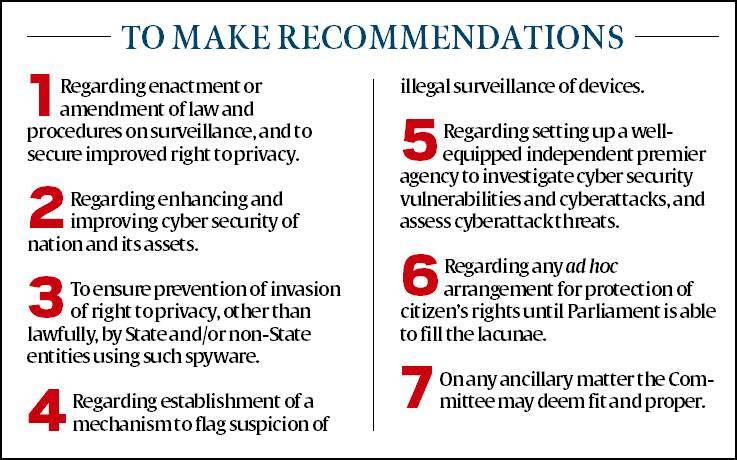Governance
Pegasus Case
- 28 Oct 2021
- 5 min read
Why in News
Recently, the Supreme Court (SC) has appointed an expert committee [to be overseen by a retired apex court judge (Justice Raveendran Committee) in the Pegasus case.
- Under the case, the Union Government is alleged to have used spyware for surveillance on private citizens.
Key Points
- Supreme Court Judgment:
- Judicial Principle Against Bias:
- The court rejected the government’s plea to set up its own probe.
- The court asserted that the government appointment of probe would violate the settled judicial principle against bias, i.e., that ‘justice must not only be done, but also be seen to be done’,”
- Formation of Expert Committee:
- On account of the government's inaction to file a detailed response to the allegations made by the petitioners, the Court has constituted a panel of experts under former SC judge Justice R V Raveendran.
- Terms of Recommendation:
- The court has also asked the Raveendran committee to make recommendations on a legal and policy framework to protect citizens against surveillance and enhance cyber security of the country.
- The court has set seven terms of reference for the committee, which are essentially facts that need to be ascertained to decide the issue.

- Judicial Principle Against Bias:
- Issues Addressed by the SC:
- Right to Privacy:
- The court reiterated that right to privacy is as sacrosanct as human existence and is inalienable to human dignity and autonomy.
- The Right to Privacy was held as a part of fundamental rights by the Supreme Court in K S Puttaswamy case, 2017.
- Any surveillance or snooping done on an individual by the state or any outside agency is an infringement of that person’s right to privacy.
- The court reiterated that right to privacy is as sacrosanct as human existence and is inalienable to human dignity and autonomy.
- Surveillance on Free Speech:
- The Court has drawn a link between surveillance and self-censorship.
- The knowledge that one is under the threat of being spied on leads to self-censorship and potential chilling effect.
- The chilling effect surveillance can produce is an assault on the vital public-watchdog role of the press, which may undermine the ability of the press to provide accurate and reliable information (Free Speech).
- It further held that, an important and necessary corollary of such a right is to ensure the protection of sources of information.
- The Court has drawn a link between surveillance and self-censorship.
- National Security as a Ground to Block Citizen's Rights:
- The Court has ruled that the state does not get a “free pass every time the spectre of ‘national security’ is raised”.
- This also means “no omnibus prohibition can be called for against judicial review” if the matter impinges on national security.
- Hence, any violation of that right by the state, even in national interest, has to follow procedures established by the law.
- Further, the order is a strong rebuttal of the government’s specious and self-serving use of national security as a ground to criminalise the forms of dissent.
- Right to Privacy:
Way Forward
- Role of Judiciary: The order is a welcome and an emphatic reassertion of the SC’s role and responsibilities as the custodian of individual rights enshrined in the Constitution.
- The letter and spirit of the court’s order will be tested by how the Justice Raveendran panel addresses them.
- Role of Legislature: There is a need to expedite the enactment of Personal Data Protection Bill 2019.
- Role of Executive: Further, It is time for the executive to stop arbitrary use of power, if any.






